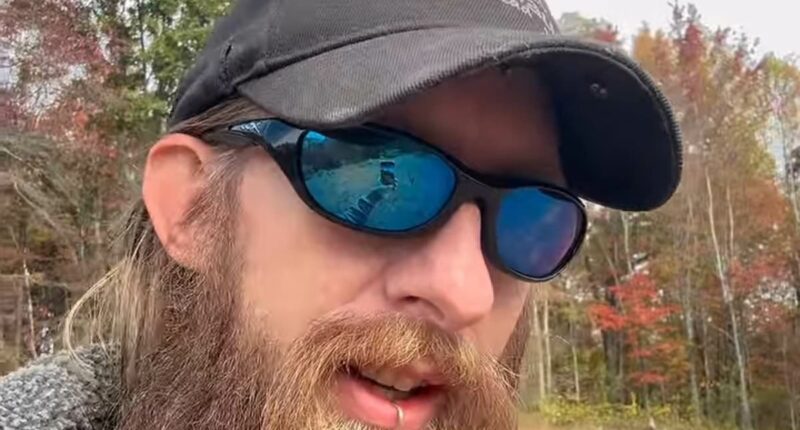Share this @internewscast.com
In March 2020, just as the COVID-19 pandemic was beginning all around the world, Nate Petroski decided to ditch his life in Pennsylvania and start his own homesteading project in West Virginia – and now, he saves $15,000 per year.
At 40, Petroski found himself navigating the challenges of life as a renovation contractor in Pennsylvania. Although his business was doing reasonably well, he owned only a modest house and a tenth of an acre of land. Despite his efforts, the high cost of living in the area left him feeling constrained.
Determined to change his circumstances, Petroski made a bold decision. “I sold everything and bought a plot of land out in the woods,” he revealed in an exclusive interview with the Daily Mail. The land was untouched when he acquired it, but he was undeterred. With a small amount of savings, he moved there, intent on making it work.
Embracing this new chapter, he named his venture NarroWay Homestead. Petroski shared his journey of transformation through social media, captivating a combined audience of over four million followers.
The move to West Virginia allowed Petroski to purchase 100 acres of land, remarkably for the same price he had paid for his much smaller plot in Pennsylvania. This decision marked the beginning of a new lifestyle, offering him both the space and freedom he had been seeking.
And so he did just that, calling it NarroWay Homestead, and documenting his journey on social media to a combined following of over four million people.
Petroski bought 100 acres of land in West Virginia, which he said was the same price as what he paid for the tenth of an acre in Pennsylvania.
He arrived to his plot of land with just an RV camper and some ‘scraps and junk’ he could use to build something out of.

In March 2020, just as the COVID-19 pandemic was beginning all around the world, Nate Petroski, 40, decided to ditch his life in Pennsylvania and start his own homesteading project in West Virginia – and now, he saves $15,000 per year

And so he did just that, calling it NarroWay Homestead , and documenting his journey on social media to over 1.3 million followers

‘The other thing I did was build a storage building really fast, just to store stuff out of the weather, and as the camper failed two years ago, I built a little 300 square foot living space in a corner of it,’ he said
‘I did my best to waterproof it, and I parked it here for the first three years,’ Petroski said of his camper van.
‘The other thing I did was build a storage building really fast, just to store stuff out of the weather, and as the camper failed two years ago, I built a little 300 square foot living space in a corner of it,’ he said.
‘I started with nothing, I didn’t even have an outhouse at first, you know, just using a shovel at the edge of the woods to bury everything.’
Over the next few years, Petroski slowly began to build out his homestead, and is still in the process of getting everything constructed, including his future house.
‘I want the house to look real big, but I don’t want a huge inside house, so it’ll probably be outrageous, like a huge mud room, lots of closets, just stuff like that,’ he explained to Daily Mail.
‘But it’ll probably end up, like 2,000 square feet or something. I kind of want to make it look like a castle and put a moat around it. I think that’d be cool,’ he said.
His homestead is run by solar-powered electricity and features a rainwater collection system that was designed and built by himself.
Petroski is also able to source some of his own food, as he has 21 ducks living on his homestead, which he uses for duck eggs and meat.

Petroski is also able to source some of his own food, as he has 21 ducks living on his homestead, which he uses for duck eggs and meat

‘I mean, no sewer bill, no gas bill, no water bill, I mean, all these bills that everybody has,’ he shared
In addition to his multiple dogs, he some potential plans to add more animals to the homestead in the future.
For other nutritional needs, he is able to purchase groceries.
Since moving to his own homestead, Petroski estimates that he saves around $15,000 per year.
‘My land taxes are $700 a year,’ he told Daily Mail. ‘One hundred and 20 acres, don’t really have an electric bill, although if something goes wrong with the solar, of course it’s going to be an expense.’
‘I mean, no sewer bill, no gas bill, no water bill, I mean, all these bills that everybody has,’ he shared.
‘Now that I’m five years into it, I can sit down and look back and see how much I’ve saved per month and how much it’s really added up.’
However, Petroski admitted that homesteading can be difficult, and that it’s not something that everybody is cut out for.
‘You can do anything for a day, you can do anything for a week, but very few people can do something like this for a long, long time,’ he said.

‘My land taxes are $700 a year,’ he told Daily Mail. ‘120 acres, don’t really have an electric bill, although if something goes wrong with the solar, of course it’s going to be an expense’

‘I think some of the ancient ways are really important. I have wood stoves, reliable heat, no matter what happens to my solar or anything, I’m always going to at least have heat in my house,’ he explained to Daily Mail

In the next few years, Petroski hopes to finish building his house and get out of the development stage
Petroski said that what differentiates him to many other homesteading is that although he likes to live traditionally, he still utilizes some modern day electronic appliances.
‘I think some of the ancient ways are really important. I have wood stoves, reliable heat, no matter what happens to my solar or anything, I’m always going to at least have heat in my house,’ he explained to Daily Mail.
‘But I also have robot lawn mowers, and they go out and cut like, two acres of grass for me, and I don’t have to worry about cutting grass,’ he said.
‘So I lean real heavily into the technology for luxuries, and at the same time, you know, do certain things primitively, I tend to lean more primitively on the things that are very, very important for survival.’
In the next few years, Petroski hopes to finish building his house and get out of the development stage.
In fact, he even sees his lifestyle as becoming a kind of retirement option many in the future.
‘I really think a lot of people, as technology increases, as rural internet gets more popular, people are going to see it more almost as a retirement option,’ he shared.
‘I think they’re going to look at this lifestyle and be like, “Hey, you know, it is a way to retire, right?”‘

















